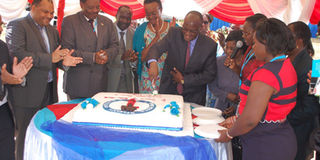Kemri investigated over Sh7.2bn budget scandal

Health Cabinet Secretary James Macharia (centre) cutting a cake to celebrate the Kenya Medical Research Institute (KEMRI) certification for the ISO 9001:2008 (QMS) at KEMRI Headquarters on December 18, 2013. PHOTO | FILE |
What you need to know:
- Key research projects, jobs at risk
The Kenya Medical Research Institute (Kemri) is under investigation after a budget of more than $80 million was depleted prematurely, threatening key research projects and putting more than 1,000 members of staff at risk of losing their jobs.
The anomaly, which has been linked to financial mismanagement, was exposed by the premier institution’s main donor, the Atlanta, US-based Centres for Disease Control (CDC), which says it is investigating the matter.
“CDC Kenya is working with the Centre for Global Health, the individual programmes and the procurements and grants office to take key measures to support Kemri in dealing with the shortfall, and to investigate and help solve financial management challenges. The CDC investigation will be comprehensive, and is likely to take another few months,” said a confidential document.
The document reveals that “while Kemri has received 92 per cent of the current year’s budget, overall it has spent nearly all the money with less than a month’s operating cost left in its account, and five months left in the budget period.”
According to a staff member who sought anonymity, some workers at the institution may not receive their March salaries on account of the anomaly. Their tenure over the next five months is uncertain too, following a decision by the CDC to only look into how to rescue what are considered life-threatening emergency programmes, such as treatment of people living with HIV and Aids.
We established that the CDC was looking at emergency funding of $5 million that will be used for very specific projects while stating that additional increments cannot be used for general operating expenses.
“CDC takes its stewardship of government resources very seriously and is investigating causes for the current funding shortfall within the co-operation agreement,” a document shared with staff states.
The organisation also says in an e-mail to staff that it is working on an “administration plan, moving forward,” a term staff say is a euphemism for a funding freeze.
Kemri is a globally respected state organisation charged with carrying out health sciences research. In the 1990s, it won acclaim for its search for a cure for HIV and Aids. Recently it was in the limelight as it supported the Ebola prevention efforts in the region by testing any suspected cases and other interventions.
The CDC funds Kemri’s research on malaria, tuberculosis and HIV/Aids, and its world-class laboratories in Nairobi and Kisumu in the west of the country. It is supports a programme for HIV care and treatment. The current cash crunch puts this crucial research work at risk.
On programmes directly affecting patients, the document notes that “CDC has requested that Kemri provide a ‘barebones’ budget for activities that need to continue to avoid harm to patients and clinical trial participants. Such activities include HIV care and treatment.
In addition, some activities will need to continue to avoid loss of major investments. Within CDC Kenya we are exploring funding options for the ‘barebones’ budget that will have to undergo review and approval from Atlanta.”
The director for the Centre for Global Health Research at Kemri, Dr John Vulule, under whose docket the programmes fall, refused to comment on the matter and instead referred the writer to the Kemri director, Prof Solomon Mpoke, who was said to be out of the country. E-mail queries to the research organisation had not been answered by Friday night.
For the full version of this article, read this week’s edition of The EastAfrican.




